MercoPress. South Atlantic News Agency
Tag: British Antarctic Survey (BAS)
-
Thursday, September 5th 2024 - 07:48 UTC
Antarctica project financed by UKRI to unlock life's secrets in extreme cold
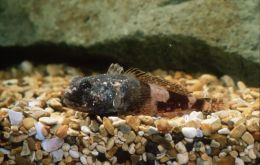
Cambridge researchers are set to explore the uncharted depths of life in the extreme cold, with findings that could reshape our understanding of biology and pave the way for future scientific breakthroughs.
-
Wednesday, August 21st 2024 - 06:59 UTC
BAS publishes carbon emissions for 2023/24, striving to reach net zero
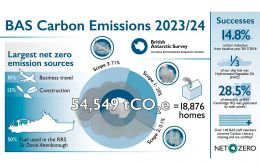
For the first time, the British Antarctic Survey (BAS) are publishing their carbon footprint data on their website to increase transparency and help other organizations reduce their carbon emissions.
-
Thursday, August 8th 2024 - 09:45 UTC
BAS Professor Lloyd Peck awarded the 2024 SCAR Medal for Excellence in Antarctic Research
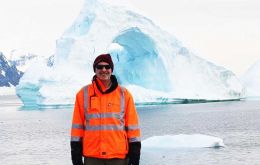
Professor Lloyd Peck FRS, Science Leader and marine biologist at British Antarctic Survey, has been announced as the 2024 recipient of the SCAR Medal for Excellence in Antarctic Research. The medals, awarded by the Scientific Committee on Antarctic Research (SCAR), recognize exceptional service to the international Antarctic community and contributions to Antarctic and Southern Ocean research.
-
Wednesday, June 26th 2024 - 09:04 UTC
The tipping point that melts large ice sheets, findings by BAS scientists
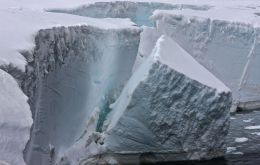
A new and worrying way that large ice sheets can melt has been characterized by scientists for the first time. The research focuses on how relatively warm seawater can lap at the underside of ground-based ice, which can accelerate the movement of the ice into the ocean.
-
Tuesday, June 18th 2024 - 11:58 UTC
State of Cetaceans 2024, ORCA report in oceans worldwide
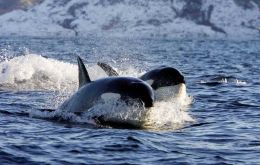
Marine Conservation Charity ORCA’s “State of the Cetaceans 2024”, (*) report is a fascinating glimpse into how the world’s whales and dolphins are coping with human impacts on the ocean. It analyses the extraordinary 330,000 kilometers of marine surveys conducted by ORCA in 2023, recording 55,604 whales and dolphins in oceans worldwide from the Arctic to the Antarctic, the North and South Atlantic, and the Pacific to the Mediterranean.
-
Saturday, May 18th 2024 - 10:45 UTC
BAS marine biologist elected to the Fellowship of the Royal Society

Professor Lloyd Peck, Science Leader and marine biologist at British Antarctic Survey (BAS), joins over 90 exceptional researchers from across the world in being elected to the Fellowship of the Royal Society, the UK’s national academy of sciences.
-
Monday, April 15th 2024 - 21:22 UTC
Falklands celebrate close bonds with BAS and RRS Sir David Attenborough
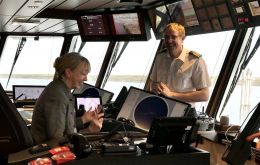
A year ago the Falkland Islands Governor Alison Blake CMG and members of the Falklands community were welcomed onboard the state of the art icebreaker RRS Sir David Attenborough. This week the Governor invited some of the crew of the Falklands flagged Sir David Attenborough before they departed for BAS bases in Antarctica.
-
Monday, March 4th 2024 - 21:18 UTC
BAS implementing Antarctic infrastructure modernization program for polar scientists
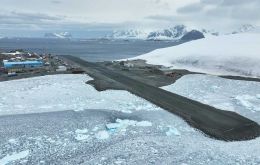
The British Antarctic Survey has been modernizing Antarctic infrastructure for future generations of polar scientists. Construction in the Antarctic is challenging and the Antarctic Infrastructure Modernization Program (AIMP) has made great progress at Rothera Research Station. The program will transform how the British Antarctic Survey enables and supports polar science.
-
Tuesday, February 27th 2024 - 20:27 UTC
Scientific teams conclude summer studies at Antarctica’s giant Thwaites Glacier
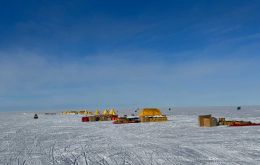
Teams of scientists and support staff with the International Thwaites Glacier Collaboration, (ITGC) have spent the past couple of months working on the Thwaites Glacier to advance our knowledge of how it interacts with the ocean and climate, and improve the predictions of its future contributions to sea level rise.
-
Tuesday, February 6th 2024 - 10:58 UTC
Britain fully confident in Falklands' security and capability of the three services
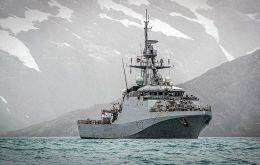
Britain remains fully confident in the security of the Falkland Islands and in the capability to defend them underlined a release from the Ministry of Defense, in response to a report in the London media claiming it only relies in a small Royal Navy patrol vessel and four RAF Typhoons to protect the South Atlantic archipelago.
